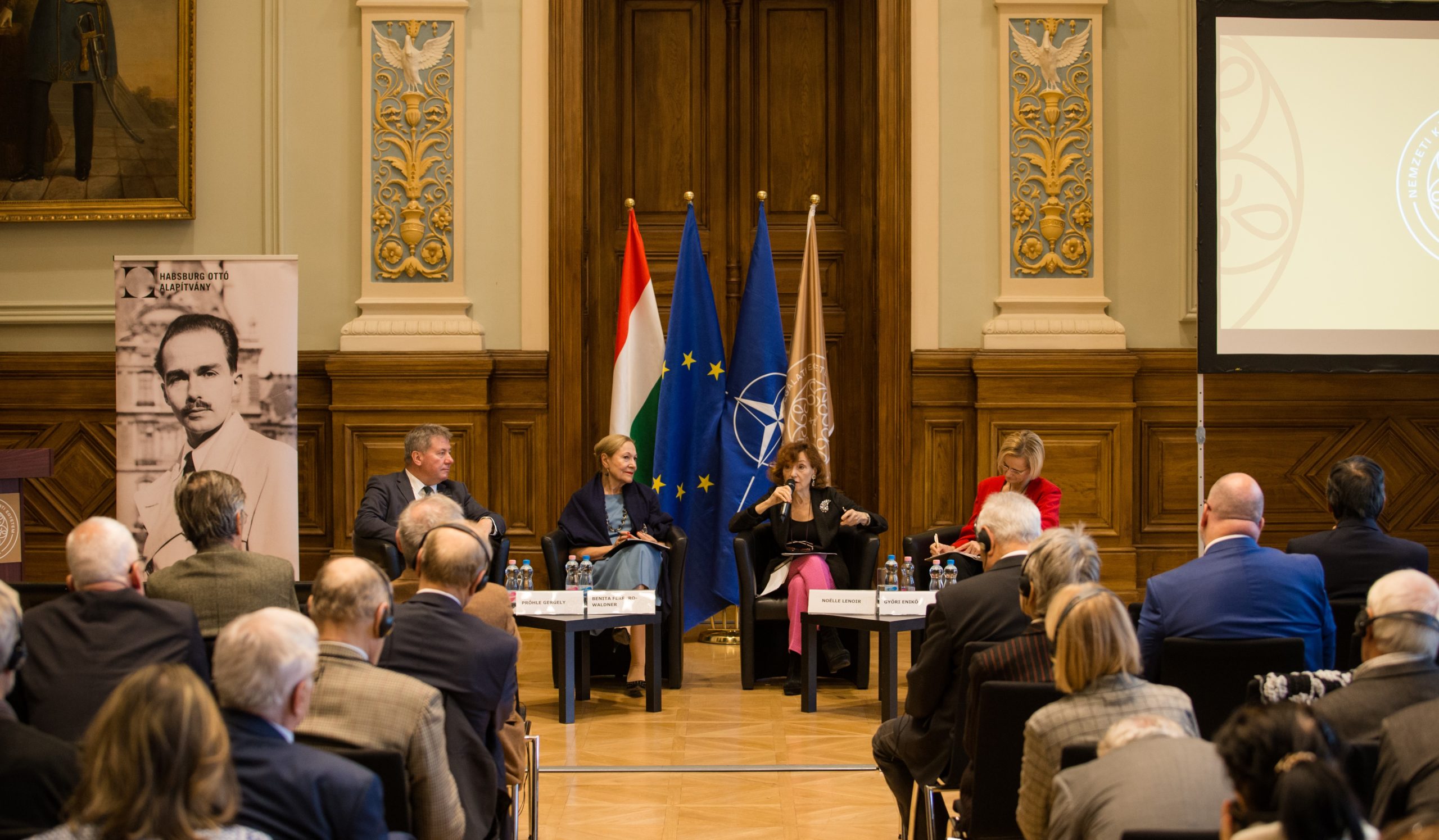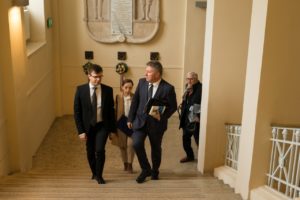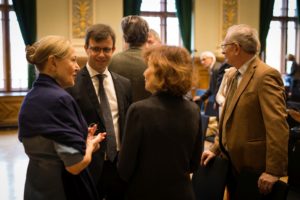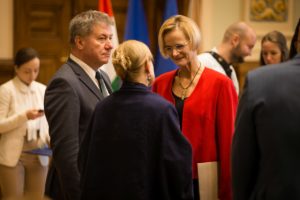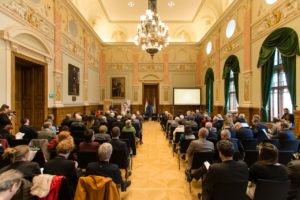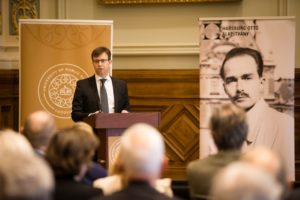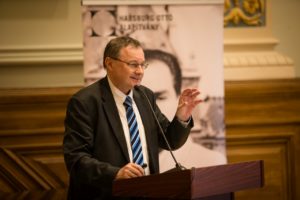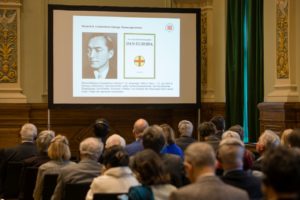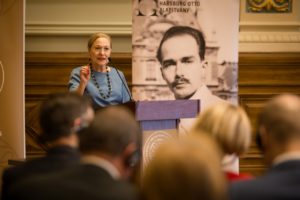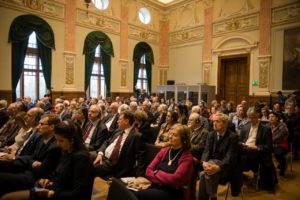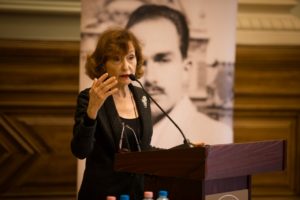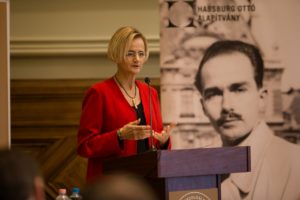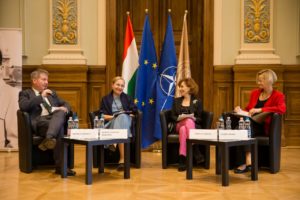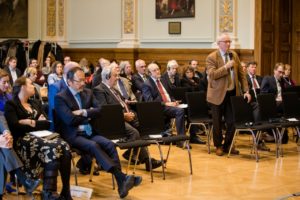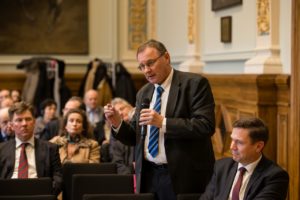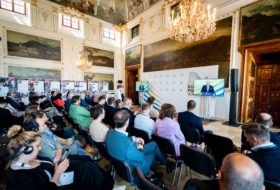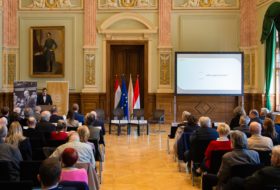In the Széchenyi Ceremonial Hall of the former building of Ludovika, the Director of our Foundation welcomed the participants. Gergely Prőhle stated that the aim of the exchange was both to reflect on the life of Otto von Habsburg and to evaluate the achievements of the thirty-year-old treaty. As he reminded the audience, our namesake believed in the idea of a united Europe and sought a political forum for his activities, through which he could have a say – no longer as a sovereign, but still – in shaping the destiny of the continent. The speakers were invited to discuss aspects of the Union’s development and institutionalisation, as well as the current situation and future challenges.
In his opening speech, János Bóka, Hungary’s Minister for European Affairs, said that Hungary accepts the EU’s principles, but will always hold the European institutions to account. While the Treaty of Rome (1957) laid the foundations of the social market economy in the western half of the continent, the key word of Maastricht was subsidiarity. However, the constantly refining rules put in place by the European institutions are increasingly running counter to the interests of member states, which are fiercely protective of their sovereignty – and the growing opposition of various national societies is leading to a weakening of the idea of a common Europe. At the same time, there are many other tasks: to expand the current Union, to preserve the freedom of individuals and natural communities, to guarantee property rights, to represent and implement the idea of social responsibility and social justice. In addition, to find a way to increase economic competitiveness. Do all these things not sound possible? Let us turn to Otto von Habsburg for encouragement, for he once said: “Those who do not believe in miracles in Europe are not realists.”
Michael Gehler, the keynote speaker of our conference from abroad, put the event of 30 years ago into historical perspective. Summarising the history of the 20th century, he noted that many of the initiatives taken between the two world wars were all intended to prevent another devastating global tragedy. It was in this spirit that Richard Coudenhove-Kalergi (1894-1972) formulated his pan-European concept, which envisaged a continent with 27 states, with a customs union and bicameral decision-making. Kalergi met Otto frequently during his exile in the United States, but despite their joint proposal for a European section at the UN in 1945, the plan remained on paper. Nor did Karl Anton Rohan’s (1898-1975) Europäischer Kulturbund, which would have liked to see the political initiative in the hands of Europe’s Christian conservative elite, solve the problems of the time. Neither could the ideas of Wilhelm Heile (1881-1969), who founded the Verband für Europäische Verständigung, or the Hungarian Elemér Hantos (1881-1947), who together with Julius Meinl had drawn up the plan for a Central European Economic Community, be realised. However, the proposal of the German Emil Mayrisch (1862-1928) and the French Pierre Viénot (1897-1944) to form an international crude steel association foreshadowed the later Coal and Steel Community.
The Head of the History Institute at the University of Hildesheim described the Maastricht Treaty of 30 years ago as the beginning of the end of the dream for the United States of Europe. After all, “integration was the salvation of the nation-state” (A. S. Milward), because without German unification, Maastricht would probably never have taken place. There are areas where there have been no breakthroughs for decades – such as the common security policy, about which a Belgian politician aptly observed that “Europe is an economic giant, a political dwarf but a military grub” – yet, in the long run, unification can only be seen as a success story. Let us add: a success story in need of constant adjustment and careful planning.
We are all inhabitants of a post-Western world, where new centres of power are emerging and we need a fresh geopolitical approach to understand and manage phenomena and processes such as migration, artificial intelligence, Brexit, pandemics, terrorism and wars, Benita Ferrero-Waldner began her speech. The former Federal Minister for European and International Affairs of the Republic of Austria considers that the EU can be enlarged in a sustainable way towards the Western Balkans and Ukraine, and that the conditions for this are present in the current legal framework without treaty change. However, the European Commission should be rationalised urgently to ensure a smoother functioning; the Councils of Ministers should be divided into permanent and rotating members, similar to the UN Security Council, and groups of member states should be formed to participate in the debates through spokespersons. The Member of the European Commission believes that qualified majority voting could speed up the decision-making process, and new models for financing the institutional system could be developed (“EU tax” is being considered in addition to/instead of the current 1% of Member States’ GDP). It is essential that the conflicts currently under way (Kosovo, Macedonia) be resolved before further accessions can take place. Ms Ferrero-Waldner also thinks that the French president’s proposal for a “multi-round union” worth considering: the Western core, the current states, the new member states and other states of the continent (such as the United Kingdom) – 40 equal members in total – would form a European political community and reach agreement on security policy, infrastructure development and transport, among others. If we want to become a community of geopolitical weight, we need to decide on these issues as soon as possible, she cautioned.
After Victor Hugo, Noëlle Lenoir, former French Minister for European Affairs, described democracy as a place where guns can be replaced by papers and ballot boxes. If only the words of the great French poet were still valid today! However, it seems that if we want to survive the perilous 21st century and save democracy and Western civilisation, we had better break with naivety and face reality and be ready to defend Europe, and the values that represent Europe.
Enikő Győri, Hungarian MEP, spoke with scepticism about the rapid reform of the institutional system, based on her experience in day-to-day politics. Instead of putting various theoretical constructs in competition with each other, she believes that we should return to the common sense of the founding fathers and ask the question they once formulated: what is good for the European citizen? In order to ensure effective decision-making, the first priority is to clarify the issue of sovereignty, and only after clearly defined jurisdictions can we move on to the much-discussed improvement of competitiveness, on which we are not doing well at all: it is because of demographic realities are working against Europe, and there is the issue of the sustainability of the high living standards that Europe has achieved in recent decades – something that people from other continents are seeking through migration – and not least the dangers of ideological thinking that has dominated Eurocracy.
In the roundtable discussion that followed the presentations, our guests exchanged views on the current situation of nation states, the changing role of Central Europe in the EU in the near future, and the meaning and reality of the Strong Europe slogan in the light of today’s global political events.
Photos: Zoltán Szabó
